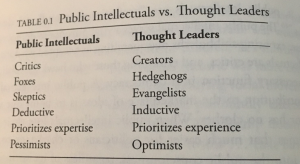We live in an age of ratings systems. On any given day, many of us interact with any number of schemes that involve the rating of movies and restaurants, Uber drivers and Air BnB owners, online retail transactions from Amazon to Ebay, and professional service providers including doctors and professors. Sometimes we are the ones being rated, sometimes we are the ones doing the rating, but more often we use the crowdsourced ratings to guide our behaviour and our choices. Some of these systems are better than others, but for better and for worse they have become part of our social infrastructure.
So it was interesting last week to see what happened after Elon Musk took to Twitter to suggest that he was going to start a ratings system for journalism:
… Continue reading“Going to create a site where the public can rate the core truth of any article & track the credibility score over time of each journalist, editor & publication.


